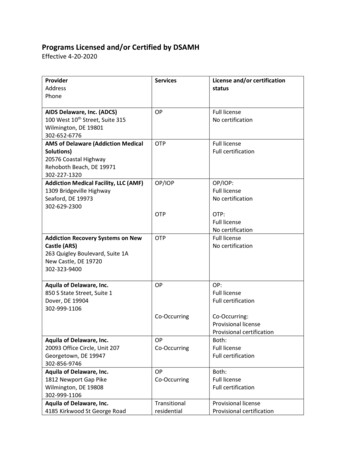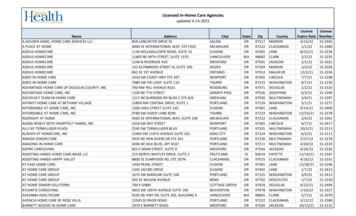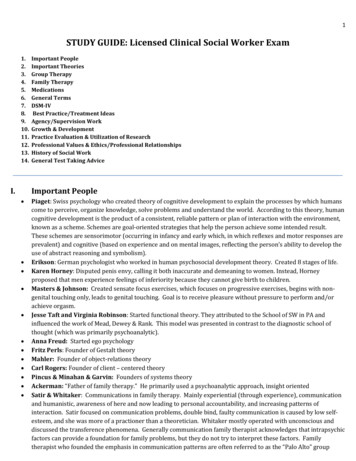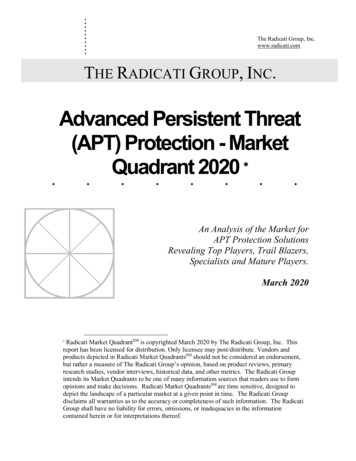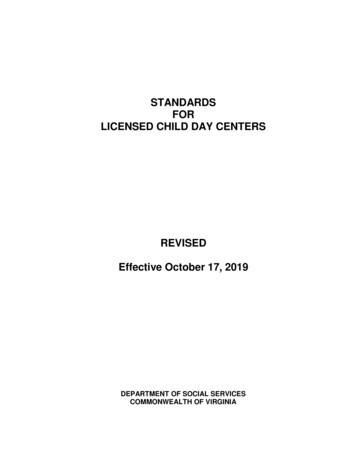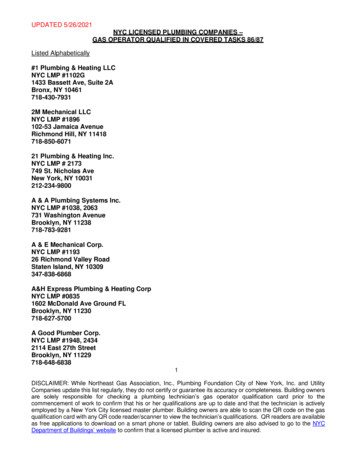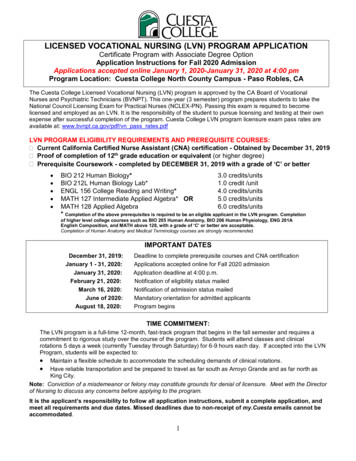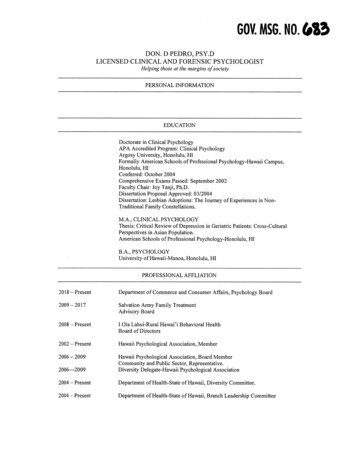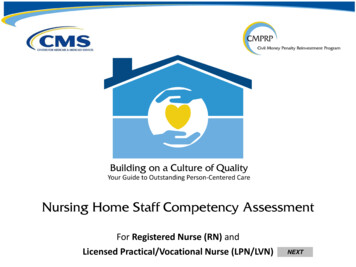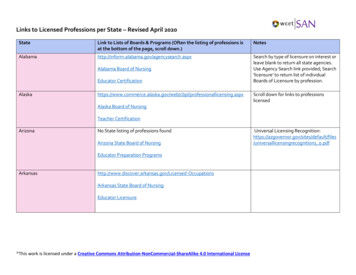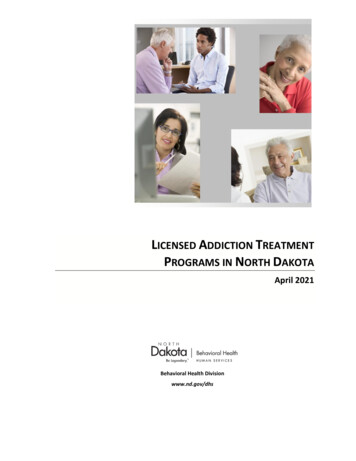
Transcription
LICENSED ADDICTION TREATMENTPROGRAMS IN NORTH DAKOTAApril 2021Behavioral Health Divisionwww.nd.gov/dhs
North Dakota Department of Human ServicesBehavioral Health Division600 E Boulevard Ave. Dept 325Bismarck, ND 58505(701) 328-8920/1-800-755-2719Fax: (701) 328-8979www.nd.gov/dhsFor additional information, contact:Julie Huwemailto:jhuwe@nd.gov(701) 328-8920/1-800-755-2719This publication is updated periodically. For the latest version, visit our web site nsing.html
Department of Human Services –Behavioral Health Division - (701) 328-8920/1-800-755-2719Licensed Addiction Treatment Programs in North Dakota1ContentsA Note About This Directory . 2Licensing Information . 2Treatment Directories. 1National Help Lines . 1North Dakota Help Lines . 2Virtual Recovery Programs . 2Recovery Resources and Supports . 3The Eight Service Regions in North Dakota . 5REGION: 1 -- WILLISTON AND SURROUNDING AREAS . 6Trenton . 6Watford City . 6Williston . 7REGION: 2 -- MINOT AND SURROUNDING AREAS . 10Minot. 10New Town . 14Parshall . 14Belcourt . 15Cando . 15Devils Lake . 16Dunseith . 16Fort Totten . 17Rocklake . 17Rolla . 17Grafton . 18Grand Forks . 18Fargo . 23Carrington. 29Jamestown . 29Beulah . 32Bismarck . 32Mandan . 39Raleigh . 40Dickinson . 40New England . 42Sentinel Butte . 42
Department of Human Services –Behavioral Health Division - (701) 328-8920/1-800-755-2719Licensed Addiction Treatment Programs in North Dakota2A Note About This DirectoryThis directory provides a listing of all licensed addiction treatment programs in North Dakota. Theprograms are listed first by region, then by city. This directory is updated periodically. For the latestversion, visit http://www.nd.gov/dhs then click on Licensing or type the following URL address inyour web ing InformationThe Behavioral Health Division (BHD) is a division of the North Dakota Department of HumanServices. One of the responsibilities of the Division is licensing alcohol and drug treatmentproviders who provide services in North Dakota.Substance abuse treatment providers are granted licenses to operate various programs followingthe levels of treatment defined by the American Society of Addiction Medicine (ASAM). Thelicensed levels of care in North Dakota are: Adult Low Intensity Residential CareAdolescent Low Intensity Residential CareAdult High Intensity Residential CareAdolescent Medium Intensity Residential CareAdult Intensive Inpatient TreatmentAdolescent High Intensity Inpatient TreatmentAdult Partial Hospitalization/Day TreatmentAdolescent Partial Hospitalization/Day TreatmentAdult Intensive Outpatient TreatmentAdolescent Intensive Outpatient TreatmentAdult Outpatient ServicesAdolescent Outpatient ServicesWithdrawal Management (Social Detoxification)DUI Seminar ProgramOpioid Treatment Programs (OTPs)Licensed programs are reviewed every other year. Some providers are “deemed status” meaningthey are certified through another accrediting body, but will be issued a new license valid up to twoyears based on our North Dakota Administrative Code (NDAC), Article 75-09.1.The Division also certifies those instructors who teach the DUI Seminar. All potential instructorsmust complete the Division-approved curriculum offered through the Prevention Research Institute(PRI) and obtain certification. Instructors must then make application with the Division to becertified as an instructor in North Dakota. To remain certified, instructors must teach the DUISeminar at least twice per certification cycle and attend DUI Seminar Instructor RecertificationTraining coordinated by the Division once every two years. A listing of licensed DUI Seminarprograms in North Dakota is also listed on our web site, as well as a listing of those addictiontreatment programs that perform DUI evaluations.
Department of Human Services –Behavioral Health Division - (701) 328-8920/1-800-755-2719Licensed Addiction Treatment Programs in North Dakota3DefinitionsN.D.A.C. - North Dakota Administrative Code.The Department of Human Services operatesunder Title 75 of the N.D.A.C., Article 75-09.1(Substance Abuse Treatment Programs),Chapter 75-09.1-01 (General Standards forSubstance Abuse Treatment Programs).ASAM - American Society of AddictionMedicine. North Dakota follows the ASAMCriteria guidelines regarding levels of care tobe used in treating alcohol or drug abuse.Outpatient Services - Adult ASAM Level 1: Anorganized nonresidential service or an officepractice that provides professionally directedaftercare, individual, and other addictionservices to clients according to apredetermined regular schedule of fewerthan nine contact hours a week.Outpatient Services - Adolescent ASAM Level1: An organized nonresidential service or anoffice practice that provides professionallydirected aftercare, individual, and otheraddiction services to clients according to apredetermined regular schedule of fewerthan five contact hours a week.Intensive Outpatient Treatment - AdultASAM Level 2.1: Treatment provided toclients requiring a primary, organizedtreatment program and who are able toestablish abstinence and recovery within thecontext of the client’s usual environment anddaily activities. Normally offered in theevening hours to facilitate a client’s ability tomaintain the usual daily activity, but may beoffered during the day.Intensive Outpatient Treatment - AdolescentASAM Level 2.1: Treatment provided toclients requiring a primary, organizedtreatment program and who are able toestablish abstinence and recovery within thecontext of the client’s usual environment anddaily activities. Normally offered in theevening hours to facilitate a client’s ability tomaintain the usual daily activity, but may beoffered during the day.Partial Hospitalization/Day Treatment Adult ASAM Level 2.5: A substance abusetreatment program that uses multidisciplinarystaff and is provided for clients who require amore intensive treatment experience thanintensive outpatient treatment but who donot require residential treatment with theexception of ASAM Level 3.1.Partial Hospitalization/Day Treatment Adolescent ASAM Level 2.5: A substanceabuse treatment program that usesmultidisciplinary staff and is provided forclients who require a more intensivetreatment experience than intensiveoutpatient treatment but who do not requireresidential treatment with the exception ofASAM Level 3.1.Low-Intensity Residential Care - Adult ASAMLevel 3.1: A substance abuse treatmentprogram that provides an ongoingtherapeutic environment for clients requiringsome structured support in which treatmentis directed toward applying recovery skills;preventing relapse; improving emotionalfunctioning; promoting personalresponsibility; reintegrating the individualinto the worlds of work, education, and familylife; and building adaptive skills that may nothave been achieved or have been diminishedduring the client’s active addiction.Low-Intensity Residential Care - AdolescentASAM Level 3.1: A substance abusetreatment program that provides an ongoingtherapeutic environment for clients requiringsome structured support in which treatmentis directed toward applying recovery skills;preventing relapse; improving emotionalfunctioning; promoting personalresponsibility; reintegrating the individualinto the worlds of work, education, and familylife; and building adaptive skills that may not
Department of Human Services –Behavioral Health Division - (701) 328-8920/1-800-755-2719Licensed Addiction Treatment Programs in North Dakota2have been achieved or have been diminishedduring the client’s active addiction.outpatient treatment no matter howintensive.Social Detoxification (WithdrawalManagement) ASAM Level 3.2-D:“Detoxification” means the process ofinterrupting the momentum of compulsiveuse in an individual diagnosed with substancedependence and the condition of recoveryfrom the effects of alcohol or another drug,the treatment required to managewithdrawal symptoms from alcohol oranother drug, and the promotion of recoveryfrom its effects. “Social detoxification” meansdetoxification in an organized residential,nonmedical setting delivered by appropriatelytrained staff who provide safe, 24-hourmonitoring, observation, and support in asupervised environment for a client toachieve initial recovery from the effects ofalcohol or another drug.Intensive Inpatient Treatment - Adult ASAMLevel 3.7: Medically monitored intensiveinpatient treatment means a substance abusetreatment program that provides a plannedregimen of 24-hour professionally directedevaluation, observation, medical monitoring,and addiction treatment in an inpatientsetting.High-Intensity Residential Care - Adult ASAMLevel 3.5: Clinically managed high-intensityresidential services means a therapeuticcommunity or residential treatment centerthat offers continuous observation,monitoring, and treatment by alliedprofessional staff designed to treat clientswho are not sufficiently stable to benefit fromoutpatient treatment no matter howintensive and who have significantpsychological and social problems.Medium-Intensity Residential Care Adolescent ASAM Level 3.5: Clinicallymanaged medium-intensity residential caremeans a substance abuse treatment programthat offers continuous observation,monitoring, and treatment by alliedprofessional staff of individuals withsignificant psychological and social problemswho are not sufficiently stable to benefit fromHigh-Intensity Inpatient Treatment Adolescent ASAM Level 3.7: Medicallymonitored intensive inpatient treatmentmeans a substance abuse treatment programthat provides a planned regimen of 24-hourprofessionally directed evaluation,observation, medical monitoring, andaddiction treatment in an inpatient setting.DUI Seminar Program ASAM Level 0.5:Alcohol or drug risk reduction educationprogram for individuals convicted of drivingunder the influence or actual physical control.Opioid Treatment Programs (OTPs) are aneffective treatment option for individualswith an addiction to opioid painmedications and/or heroin. Treatmentincludes on-going assessments by a medicalprofessional, medication monitoring, andaddiction counseling by a licensed addictioncounselor. OTPs are regulated by both theFederal and State Government.
Department of Human Services –Behavioral Health Division - (701) 328-8920/1-800-755-2719Licensed Addiction Treatment Programs in North Dakota1Treatment DirectoriesBehavioral Health Treatment Services Locator: https://findtreatment.samhsa.gov/Buprenorphine Physician & Treatment Program Locator: orEarly Serious Mental Illness Treatment Locator: al Help LinesSuicide Prevention Lifeline1-800-273-TALK (8255)TTY: 1-800-799-4889Website: www.suicidepreventionlifeline.org (link is external)24-hour, toll-free, confidential suicide prevention hotline available to anyone in suicidal crisis oremotional distress. Your call is routed to the nearest crisis center in the national network of morethan 150 crisis centers.SAMHSA's National Helpline1-800-662-HELP (4357)TTY: 1-800-487-4889Website: www.samhsa.gov/find-help/national-helplineAlso known as, the Treatment Referral Routing Service, this Helpline provides 24-hour free andconfidential treatment referral and information about mental and/or substance use disorders,prevention, and recovery in English and Spanish.Disaster Distress Helpline1-800-985-5990Website: eStress, anxiety, and other depression-like symptoms are common reactions after any natural orhuman-caused disaster. Call this toll-free number to be connected to the nearest crisis center forinformation, support, and counseling.Veteran's Crisis Line1-800-273-TALK (8255)TTY: 1-800-799-4889Website: www.veteranscrisisline.net (link is external)Connects veterans in crisis (and their families and friends) with qualified, caring Department ofVeterans Affairs responders through a confidential, toll-free hotline, online chat, or text.Drug-Free Workplace1-800-WORKPLACE (967-5752)Website: ineAssists employers and union representatives with policy development, drug testing, employeeassistance, employee education, supervisor training, and program implementation.
Department of Human Services –Behavioral Health Division - (701) 328-8920/1-800-755-2719Licensed Addiction Treatment Programs in North Dakota2North Dakota Help LinesFirstLink 211211Confidential Service available to anyone for listening and support, referrals to resources/help andcrisis interventionRecovery Talk1-844-44TALK2 (1-844-448-2552Talk with a trained peer support specialist in North Dakota with lived experience in addiction to chatand receive support.Virtual Recovery ProgramsAlcoholics Anonymous: Offers online support http://aa-intergroup.org/Cocaine Anonymous: Offers online support and services https://www.ca-online.org/LifeRing: LifeRing Secular Recovery offers online support https://www.lifering.org/online-meetingsIn The Rooms - Online Recovery Meetings: Provides online support through live meetingsand discussion groups https://www.intherooms.com/home/Marijuana Anonymous: Offers virtual support https://ma-online.org/Narcotics Anonymous: Offers a variety of online and skype meeting optionshttps://www.na.org/meetingsearch/Reddit Recovery: Offers a virtual hang out and support during recoveryhttps://www.reddit.com/r/REDDITORSI NRECOVERY/Refuge Recovery: Provides online and virtual support http://bit.ly/refugerecovery1Self-Management and Recovery Training (SMART) Recovery: Offers global community of mutualsupport groups, forums including a chat room and message board www.smartrecovery.orgSoberCity: Offers an online support and recovery community https://www.soberocity.com/
Department of Human Services –Behavioral Health Division - (701) 328-8920/1-800-755-2719Licensed Addiction Treatment Programs in North Dakota3Soberistas: Provides a women-only international online recovery communityhttps://soberistas.com/Sober Recovery: Provides an online forum for those in recovery and their friends and familyhttps://www.soberrecovery.com/forums/We Connect Recovery: Provides daily online recovery groups for those with substance use andmental illness rt-meetingsUnity Recovery WEconnect Alano
addiction services to clients according to a predetermined regular schedule of fewer than five contact hours a week. Intensive Outpatient Treatment - Adult ASAM Level 2.1: Treatment provided to clients requiring a primary, organized treatment program and who are
